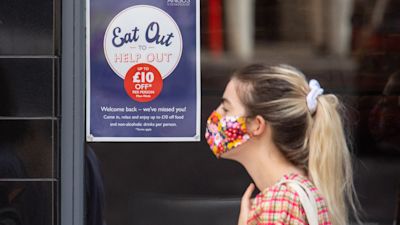Latest inflation rates revealed amid rising fuel and transport costs

The UK's rate of inflation decreased slightly last month due to the unwinding effect of last year's Eat Out to Help Out scheme, despite rising fuel and transport costs.
The Office for National Statistics (ONS) said Consumer Prices Index (CPI) inflation fell to 3.1% in September - down from 3.2% in August. The figure still remains way above the Bank of England’s target rate of 2%, and Business Secretary Kwasi Kwarteng has called it "a real cause of concern".
Speaking on BBC Breakfast, Mr Kwarteng said: “I think it’s a real cause of some concern, because clearly we want inflation rates to be lower.
“One of the causes of slightly higher inflation is the fact that the economy is rebounding, and you’ve made the point that it was from a low point, but it’s still a fast rebound, and when you see quite strong economic growth there is always the danger that you’ll have inflation.
“I speak to the governor of the Bank of England, they’re hopeful that the inflation rate will be contained, that’s something that they’re looking at actively.” Analysts had forecast that inflation was likely to stay flat at 3.2% for the month, The Office for National Statistics said.
Mike Hardie, head of prices at the ONS, explained: “Annual inflation fell back a little in September due to the unwinding effect of last year’s ‘Eat Out to Help Out,’ which was a factor in pushing up the rate in August.
“However, this was partially offset by most other categories, including price rises for furniture and household goods and food prices falling more slowly than this time last year.
“The costs of goods produced by factories rose again, with metals and machinery showing a notable price rise.
"Road freight costs for UK businesses also continued to rise across the summer.”
Average petrol prices stood at 134.9 pence per litre in September 2021, compared with 113.3 pence per litre a year earlier, as fuel provided an upward pressure on inflation, the ONS said.
It added that a rise in used car prices – which were 2.9% higher in September than the previous month – also contributed to increased transport costs. The rebound in air and sea passenger transport also had a positive impact. Household goods also increased for the month, with furniture and furnishings increasing by 3.8% against September last year. However, the ONS said these rises were offset by deflation across restaurants and hotels. It said this was driven by the removal of discounting last year due to the Eat Out to Help Out scheme.
Martin Beck, senior economic adviser to the EY Item Club, a leading economic forecasting group, said: “The Club expects inflation to pick up again in October, once the 12% increase in the energy price cap takes effect. “A number of factors are then likely to push CPI inflation up to over 4% by the end of the year and keep it at a high rate – by the standards of recent years – through the first half of 2022. “The recent increases in the oil price will continue to feed through to petrol prices, while component shortages and supply chain challenges will continue to put upward pressure on global goods prices.” The Retail Price Index (RPI), a separate measure of inflation, increased to 4.9% for the month. The CPI, including owner-occupiers’ housing costs (CPIH) – the ONS’s preferred measure of inflation – was 2.9% in September, compared with a 3% reading in August.